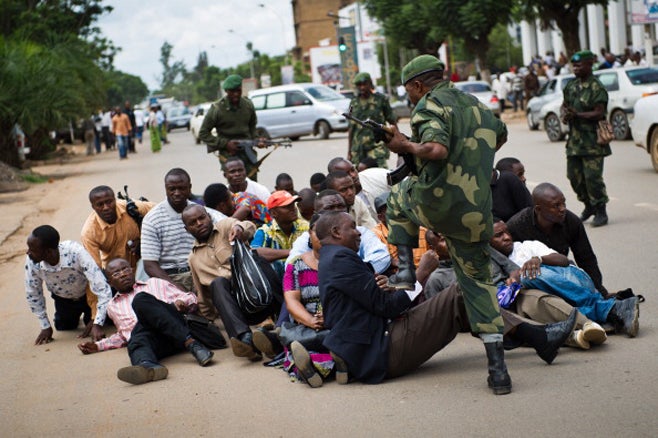By Zach Waksman
Impunity Watch Reporter, Africa
KINSHASA, Democratic Republic of Congo – Etienne Tshisekedi, Congo’s opposition leader, held an inauguration ceremony for himself as president of the central African country on Friday. The ceremony, which happened three days after the inauguration of President Joseph Kabila, serves as a sign of his disregard for the results of last month’s election, officially decided in favor of Kabila. Originally scheduled to take place at Stade des Martyrs, the event was moved to Tshisekdi’s home after police prevented both Tshisekedi and his supporters from attending.

Tshisekedi’s Union for Democracy and Social Progress (UDPS) party invited supporters, journalists, and diplomats to attend the event, but police acted to disperse would-be attendees. Several were arrested as they attempted to enter the stadium, and others were subjected to stun grenades. No injuries were reported. The government banned the ceremony itself and dispatched heavily armed security forces around the stadium, which is located in an area of Kinshasa that strongly supports Tshisekedi. The BBC reported that its recording equipment was confiscated.
Opposition supporters also flocked to their leader’s house, where the ceremony eventually took place. Police cordoned off the streets surrounding it. They fired tear gas into the assembled crowds at both locations. Other weapons spotted included water cannons, machine guns, and rocket-propelled grenades. The military presence was greater in areas that backed Tshisekedi.
Reaction was mixed, with some fearing that this demonstration has the potential to continue what has already been a contentious aftermath to the country’s second ever democratic election. Last month’s election has been a source of dispute in both the Congo and the international community. Despite allegations of voter fraud, the country’s Supreme Court confirmed the results on December 16, with incumbent Kabila the victor with 49 percent of the vote, versus only 32 percent for Tshisekedi. The UDPS party disagreed and considered Kabila’s victory a fallacy.
“Before thinking about the destabilization of the country, we have to think about the truth of the vote,” said Tshisekedi advisor Valentin Mubake. “The reality of the elections is that Tshisekedi has been elected by the Congolese people. That [means] the stabilization of Congo and that is reality.”
Before Tshisekedi took the oath at his ceremony, spokesman Albert Moleka introduced him by saying that he had won with 53 percent of the vote.
Government spokesman Lambert Mende called the ceremony a “non-event.”
“It’s an extremely regrettable act,” he said, adding that officials were “saddened” that Tshisekedi “was expressing his frustration over his defeat in this fashion.”
Others connected to the regime concurred.
“Anyone who makes pantomime politics and declares himself president will have to face the law of the land,” said Kikaya Bin Karubi, Congo’s ambassador to the United Kingdom. “We will not tolerate someone disturbing the peace and thinking his dreams are reality.”
Questions have also arisen over the behavior of Congolese security forces. On Wednesday, Human Rights Watch reported that they have killed at least 24 people since the results were announced in early December. The report shows numerous occasions of security forces, including the elite Republican Guard which is tasked with the President’s protection, firing on civilians in an effort to break up potential demonstrations and detaining dissenters. The Republican Guard does not have the authority to arrest or detain civilians.
When asked by Human Rights Watch, Gen. Charles Bisengimana, the nation’s police chief, said that he could ask the Congolese army for help if police could not maintain order. He had not done so because Kinshasa had been calm. He did not expect any need to call on them in the near future. He also could not explain why the Republican Guard was in Kinshasa, saying that he had no authority over them.
“The callous shooting of peaceful demonstrators and bystanders by the security forces starkly illustrates the depths the government will reach to suppress dissenting voices,” said Anneke Van Woudenberg, a senior Africa researcher for Human Rights Watch. “The UN and Congo’s international partners should urgently demand that the government rein in its security forces.”
For more information, please see:
BBC — DR Congo Police Block Entry to Tshisekedi Inauguration — 23 December 2011
Congo Planet — Tshisekedi Stages Self-Inauguration at Home — 23 December 2011
Guardian — Congo’s Opposition Leader Holds Own Inauguration Ceremony — 23 December 2011
Voice of America — Police in D.R. Congo Fire Tear Gas at Protesters — 23 December 2011
Human Rights Watch — 24 Killed since Election Results Announced — 21 December 2011